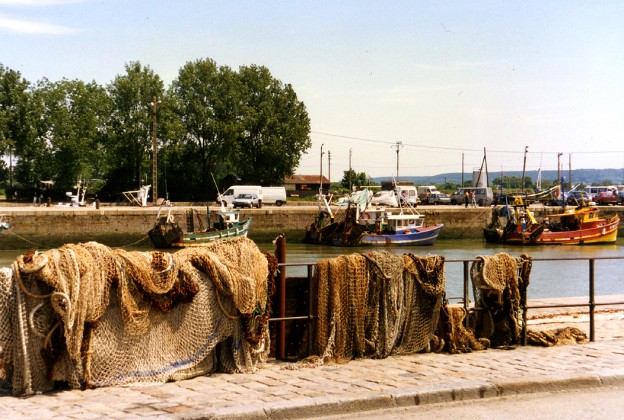
Photo: crabchick/Flickr
Sustainable seafood continues to be a hotbed issue in New England as the public becomes more and more aware of how to keep our region’s iconic fish swimming in the ocean and not lost to a page in an historical maritime encyclopedia.
Recently, the tide has been rising in the right direction, with Shaw’s Supermarkets announcing its agreement with the Marine Stewardship Council to commit fully to MSC-certified sustainable fisheries — a move that will hopefully rock the supermarket industry’s boat, so to speak.
PRK continues to follow the debate, in all its complexities. To learn what’s new — and to share that with you — we spoke with Chef Barton Seaver, an acclaimed sustainable seafood advocate.
We caught up with Seaver here in Boston. Last night he spoke at the New England Aquarium, signing his new book For Cod and Country and talking about how eating correctly can help us sustain healthy relationships between our world’s ecosystems and each other. Chef Seaver is an expert in conservation, sustainability and culinary innovation, and has made a name for himself as a National Geographic Fellow, a host of the National Geographic web series Cook Wise and the TV series In Search of Food, and a champion of titles such as Esquire Chef of the Year (2009), Seafood Choices Alliance’s Seafood Champion Award (2008) and the Restaurant Association of Metropolitan Washington’s Rising Culinary Star (2008). Chef Seaver’s book has been highly praised by seafood lovers who need their fix, but are respectful of our oceans’ bounty and the choices that should remain for future generations of fish eaters.
Read on to see what Chef Seaver has to say on IFQ’s, the fishing community and the New England Aquarium’s role in education– plus his recommendation of a great fall meal featuring sustainable fish.
PRK: Locally, we sense that people trying, really trying, to make responsible choices when consuming seafood. What’s new on the sustainability horizon that you feel the public should know? Are there any new initiatives in the works that you are excited about?
BS: New individual fishing quota (IFQ) management systems are being implemented across many regions with great success. There’s still a little bit of tweaking that needs to be accomplished for this to fit perfectly in every region, but the fact that fishermen are able to own and leverage quota and, therefore, borrow against it with traditional asset-based bank loans is helping to shift away from the harmful economics that have plagued fisheries to date. The IFQs create a very real financial reward mechanism that helps to restore populations of fish and, in doing so, serves to increase quota over time.
PRK: You travel a great deal. Do you find a discernible difference in attitude between the East Coast and West Coast on the issue of seafood sustainability? If there are differences, are they productive? Are they resolvable? What, perhaps, can we learn from one another?
BS: I would say that sustainable seafood and the attending consumer awareness are about even-paced almost everywhere in this country that I have seen. These issues are enormously complex and are not limited to the empirical measures of fish stocks. Rather, they are the confluence of a host of regionally specific, species-specific, and culturally specific variables. The conservation industry has, by-and-large, advertised the principles of sustainable seafood to be on a scientific measure. In my opinion, sustainable seafood is mostly about the men and women who fish and the men and women and children who eat that fish for dinner. We are just beginning to tailor the lexicon of sustainability to be inclusive of fishermen and their roles within our communities and local economies. We need to expand this discussion to incorporate the opportunity consumers have to play a vital role in helping not only to support “sustainable” fisheries, but also to greatly accelerate the pace of restoration by supporting fisheries that are actively improving.
PRK: Why did you choose to speak at the New England Aquarium tonight? What do you feel the NEAQ is doing well?
BS: NEAQ is making huge strides in educating about the very important historical, cultural, and economic role of seafood, fishermen, and their reliant communities, as much as they are educating about an ocean world that is beyond our sights. The Aquarium is a great beacon in the heart of some of the most complex and controversial fishing communities in the world, and has leveraged this into an opportunity to play the role of convener. In my opinion, fishermen deserve as much protection as do fish. And so it is only through community dialog that we can create the necessary understanding of how we can restore the prudence, profitability, and pride of our famed fisheries. NEAQ sits at the heart of the matter.
PRK: What is your favorite sustainable seafood dish for this time of year?
BS: All up and down the East Coast the prized sportfish of summer–the bluefish, striped bass–are fat, well-fed and are heading south. In the legendary fisheries off the Cape, Montauk, and the Chesapeake Bay, the waters begin to boil against crashing fins and delicious fish. This time of year also represents the last opportunities of the season to gather friends and family members outside for dinner around the grill. There’s nothing more exciting than a slowly smoked fillet of fatty bluefish served with last-of-the-season tomatoes, fresh herbs, and the first of the sweet, hearty winter squashes. It’s the perfect meeting of the bounty of two colliding seasons.

Pingback: Fish Talk in the News – Thursday, October 20 - Talking Fish